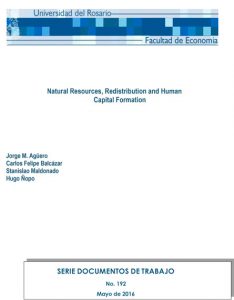Natural resources, redistribution and human capital formation
| Año | : | 2016 |
|---|---|---|
| Autor/es | : | Jorge Agüero, Carlos Felipe Balcázar, Stanislado Maldonado, Hugo Ñopo |
| Área/s | : | Empleo, productividad e innovación, Recursos naturales, industrias extractivas y conflictos sociales |
How do resource booms affect human capital accumulation? The authors exploit time and spatial variation generated by the commodity boom across local governments in Peru to measure the effect of natural resources on human capital formation. The authors explore the effect of both mining production and tax revenues on test scores, finding a substantial and statistically significant effect for the latter. Transfers to local governments from mining tax revenues are linked to an increase in math test scores of around 0.23 standard deviations. The authors find that the hiring of permanent teachers as well as the increases in parental employment and improvements in health outcomes of adults and children are plausible mechanisms for such large effect on learning. These findings suggest that redistributive policies could facilitate the accumulation of human capital in resource abundant developing countries as a way to avoid the natural resources curse.






